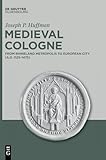Medieval Cologne : From Rhineland Metropolis to European City (A.D. 1125–1475) / Joseph P. Huffman.
Material type: TextPublisher: Mnchen ; Wien : De Gruyter Oldenbourg, [2024]Copyright date: 2025Description: 1 online resource (XII, 658 p.)Content type:
TextPublisher: Mnchen ; Wien : De Gruyter Oldenbourg, [2024]Copyright date: 2025Description: 1 online resource (XII, 658 p.)Content type: - 9783111570860
- 9783111571355
- 9783111571140
- 943/.551402 23/eng/20241031
- DD901.C76 H84 2025
- online - DeGruyter
- Issued also in print.
| Item type | Current library | Call number | URL | Status | Notes | Barcode | |
|---|---|---|---|---|---|---|---|
 eBook
eBook
|
Biblioteca "Angelicum" Pont. Univ. S.Tommaso d'Aquino Nuvola online | online - DeGruyter (Browse shelf(Opens below)) | Online access | Not for loan (Accesso limitato) | Accesso per gli utenti autorizzati / Access for authorized users | (dgr)9783111571140 |
Frontmatter -- Forward: Historical Recovery and Preservation -- Contents -- Prologue: From Roman Colony to Medieval Metropolis. Cologne’s Late Antique and Early Medieval Legacy -- Section I: The Medieval Metropolis in a Changing World: The Decline of Imperial Authority in the Rhineland and Lotharingia (1122–1192) -- Chapter 1 The Fusion of Imperial and Regional Politics in the Early Twelfth Century -- Chapter 2 The Separation of Imperial and Regional Politics in the Late Twelfth Century: Lombardy and Lower Rhineland -- Chapter 3 The Separation of Imperial and Regional Politics in the Late Twelfth Century: Lotharingia and Westphalia -- Chapter 4 The Urban Development of Cologne by the Close of the Twelfth Century -- Section II: Later Medieval Cologne – The Separation of Herrschaft and Gemeinde -- Chapter 5 Herrschaft and Gemeinde during the Staufen-Welf Thronstreit (1198–1216) -- Chapter 6 Herrschaft and Gemeinde in the Aftermath of the Staufen-Welf Thronstreit (1216–1238) -- Chapter 7 Herrschaft and Gemeinde during the Troubled Years of Conrad of Hochstaden. From Excommunicate Archbishop-Elect to the Rhenish League (1238–1256) -- Herrschaft and Gemeinde during the Ascendency of Conrad of Hochstaden. From Election of Richard of Cornwall to Defeat of the Meliorat (1256–1261) -- Chapter 9 The Great Pivot: Separation of Herrschaft and Gemeinde (1261–1274) -- Chapter 10 Geschlechter and Gemeinde: From Patrician Oligarchy to Free Imperial City. (1275–1475) -- Section III: Later Medieval Cologne – Gemeinde and Gesellschaft -- Introduction -- Chapter 11 On Raising Financial Capital for Charity – Hospital Endowment Practices (ca. 1200–1350) -- Chapter 12 On the Use of Urban Space: Civic and Sacral Topographies of Cologne -- Chapter 13 On Social Life -- Chapter 14 On Economic Life -- Chapter 15 On Religious and Cultural Life -- Epilogue: From Medieval Metropolis to European City – Cologne in Comparative Context -- Abbreviations -- Name Index -- Place Index -- Subject Index
restricted access online access with authorization star
http://purl.org/coar/access_right/c_16ec
In Anglophone literature, historical questions about urban, socio-economic, political, religious, and cultural development have often been answered using Anglo-French, Anglo-Low Countries, and Anglo-Italian paradigms and sources. Medieval Germany has been largely overlooked, seen as a peripheral and irrelevant anomaly. Conversely, scholars from the German Rhineland have mostly remained within the traditions of civic public history and Landesgeschichte. As a result, they rarely engage with the historical questions raised in wider European discourses.This volume challenges these historiographical propensities by offering a fresh perspective on medieval urban Germany. It aims to integrate Cologne and the Rhineland more accurately and equitably into the wider histories of medieval Europe. The book engages with historical questions of wider relevance across both German and European medieval histories. It invites all scholars and students of medieval Europe to utilize Cologne as a key source for their research and writing.
Issued also in print.
Mode of access: Internet via World Wide Web.
In English.
Description based on online resource; title from PDF title page (publisher's Web site, viewed 20. Nov 2024)


